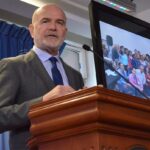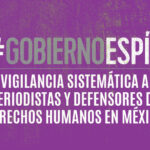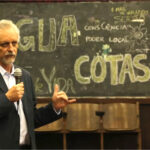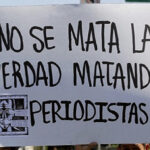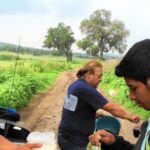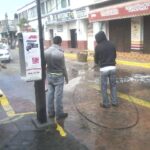Saludos.
El Relator especial de los Derechos Humanos de la Organización de las Naciones Unidas, presentó su informe anual mecionando la situación de México.a continuación el boletín de la ONU:
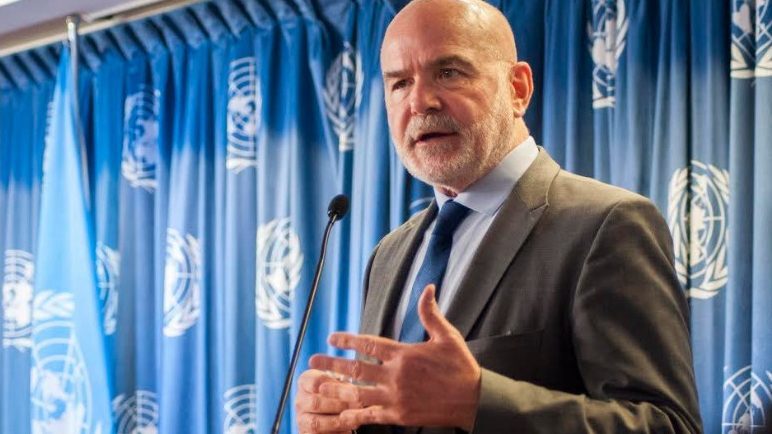
(1 de Marzo) México se ha convertido uno de los países más peligrosos del mundo para los periodistas y los defensores de derechos humanos, indicó este jueves Michel Forst en la presentación de su informe anual ante el Consejo de Derechos Humanos.
Forst apoyó su declaración al recordar el reciente asesinato de la periodista Pamela Montenegro en Acapulco y el de la líder indígena Guadalupe Campanur en Michoacán.
El relator pidió a las autoridades que reviertan esta “tendencia inadmisible”, a través de una política de tolerancia cero con la corrupción y el crimen organizado.
Entre las categorías de defensores que corren mayores riesgos, figuran los protectores de los derechos económicos, sociales y culturales; los defensores medioambientales; familiares y víctimas de los desaparecidos y los defensores de los derechos LGBTI, entre otros.
Además, Forst indicó que México es el país más violento de Mesoamérica para las mujeres defensoras de los derechos humanos, pero destacó como positivas una serie de iniciativas llevadas a cabo por las autoridades para contrarrestar estos ataques.
A continuación, destacó que, no obstante, el país azteca ha sido uno de los líderes a nivel mundial en la creación de un mecanismo nacional de protección para los defensores de los derechos humanos. en situación de peligro.
“Insto a México a que invierta la actual tendencia negativa haciendo de la protección de los defensores de derechos humanos y el fin de la impunidad una prioridad nacional”, finalizó Forst.
Los relatores especiales y expertos independientes forman parte de lo que se conoce como los Procedimientos Especiales del Consejo de Derechos Humanos. Los Procedimientos Especiales, el mayor órgano de expertos independientes en el sistema de la ONU para los Derechos Humanos, es el nombre general de los mecanismos de investigación y monitoreo del Consejo de Derechos Humanos para hacer frente a situaciones concretas en países o a cuestiones temáticas en todo el mundo. Los expertos de los Procedimientos Especiales trabajan de manera voluntaria; no son personal de la ONU y no perciben un salario por su labor. Son independientes de cualquier gobierno u organización y actúan a título individual. Más información en: http://www.ohchr.org/EN/HRBodies/SP/Pages/Welcomepage.aspx
A continuación citamos su mensaje completo (No hay versión en español), si saben algo de Inglés y/o fránces podrán practicar un poco:
ORAL STATEMENT OF MICHEL FORST
SPECIAL RAPPORTEUR ON THE SITUATION OF HUMAN RIGHTS DEFENDERS37th session of the Human Rights Council
GENEVA, 1 March 2018
Monsieur le Président,
Excellences,
Mesdames et Messieurs,
C’est pour moi un honneur de m’adresser à vous aujourd’hui en tant que Rapporteur spécial sur la situation des défenseurs des droits de l’homme concernant des questions relatives à mon mandat. Je présente aujourd’hui mon rapport thématique annuel, qui se concentre sur la situation des défenseur.e.s travaillant pour les droits des populations en mouvement.
De plus, vous aurez à votre disposition les rapports de mes visites-pays en Australie et au Mexique, que j’ai entreprises en octobre 2016 et en janvier 2017 respectivement, ainsi qu’un rapport avec mes observations sur les communications envoyées et les réponses reçues au cours de 2017.
Permettez-moi s’il vous plait de commencer cet échange par une pensée pour tous les défenseures assassinées au cours de ces derniers mois. Cette année encore, nous avons perdu des amies, des collègues, des partenaires. Je pense notamment à Godfrey Luena en Tanzanie, à Lando Moreno aux Philippines, à Ofelia Espinoza De Lopez en Colombie, à Yameen Rasheed aux Maldives ou encore à Gamal Sorour en Egypte. Ils et elles sont trop nombreux pour tous et toutes les nommer ici et nous savons que beaucoup d’autres sont morts dans l’anonymat de leur engagement. Je ne peux m’empêcher de penser que toutes ces morts tragiques étaient évitables si les États avaient respecté leur engagement de protéger celles et ceux qui défendent nos droits, la démocratie et le vivre ensemble.
Au cours de l’année 2017, j’ai eu l’occasion de parcourir le monde pour constater une nouvelle fois l’extraordinaire dynamisme de la société civile, sa résilience et sa détermination à conquérir et préserver nos droits. Grâce au soutien de la coopération internationale, j’ai pu participer à de nombreuses rencontres institutionnelles, à des événements académiques, que ce soit au Brésil, au Cambodge, en Côte d’Ivoire, en Espagne, aux États-Unis, en Italie, en Israël ou encore en Thaïlande, pour ne nommer que quelques initiatives. Je souhaite remercier chaleureusement tous les gouvernements et les acteurs de la société civile qui ont permis le bon déroulement de ces activités et je ne peux que réitérer l’importance de pouvoir aller à la rencontre des acteurs sur le terrain pour engager avec celles et ceux qui n’ont la possibilité de se déplacer à Genève.
Excellencies,
Ladies and Gentlemen
As you will see in my observations report (A/HRC/37/51/Add.1), I sent a total of 210 communications to 79 States (and 8 other actors), both individually and in collaboration with other mandate holders, addressing the situation of over 547 people, of whom 130 were women. I also issued some 62 press releases. The report also contains 15 cases of alleged reprisals for cooperation with the United Nations and its mechanisms or representatives in the sphere of human rights, as well as 11 communications concerning draft legislation at the national level that could have a negative impact on the environment in which human rights defenders perform their activities
I note with satisfaction that there has been a 12 percent increase in the State response rate during the reporting period. (We went from 44 to 56 percent in 2017). This is an important indicator of the level of engagement of States with my mandate. I thank those States that have provided substantive replies to my communications and encourage other States to engage with us and respond in due time. You may recall that one of my commitments was to improve the communications received by my mandate and during 2018, I will continue my endeavours to develop new methods to better attend urgent situations of defenders at risk.
2017 has been less successful with regard to State cooperation with my mandate in relation to official Country visits. Some States have not reacted to my requests for years, while others have not materialized the specific dates for the visit. I am grateful to the Government of Mexico for having accepted my visit, which took place in January 2017 and to the Government of Honduras for accepting my request to visit during the first half of 2018. I continue now consultations with the Governments of the Democratic Republic of Congo, Saudi Arabia, Moldova and Peru for this purpose, and I hope that the States concerned will give due attention and respond positively. As we celebrate in 2018 the 20th anniversary of the Declaration on human rights defenders, invitations to undertake official visits will be seen as a strong commitment to recognize the importance of human rights defenders.
Distinguished delegates,
In October 2016, I conducted an official visit to Australia and in January 2017 to Mexico. I thank both Governments for their invitation, cooperation and assistance during and after the visit.
I would like to commend Mexico for the efforts undertaken to face the countless attacks against human rights defenders. Despite these efforts, I assessed during my visit the extreme violence affecting human rights defenders in the country. The official and unofficial records of defenders killed and attacked in Mexico and the criminalization of their human rights work show that Mexico have become one of the world’s most dangerous country for defenders. Just a few days ago journalist Pamela Montenegro was murdered in Acapulco and the Indigenous leader Guadalupe Campanur was killed in Michoacán. To revert this unacceptable trend, the almost absolute impunity that prevails must end as unanimously echoed by the Treaty bodies and Special procedures examining the human rights situation in Mexico over the past five years. There must be zero tolerance with the alleged corruption and organized crime.
The majority of defenders I met during my visit confirmed their experience of intimidation, harassment and stigmatization in the hands of State and non-State actors in retaliation for their human rights work. According to available data reflected in my report, Mexico has reportedly become the most violent country for women human rights defenders in Mesoamerica and ranks among the most dangerous for journalists. I was struck by the discrimination women human rights defenders face in their work and when seeking protection from authorities.
In my assessment of the situation of human rights defenders in Mexico, I have also identified that the following categories of human rights defenders are at aggravated risk. In particular: defenders promoting economic, social and cultural rights (among the most criminalized); land and environmental defenders; families and victims of the disappeared; whistleblowers (who are unprotected by the legal framework in place); defenders working on migrant’s rights (in particular those targeted by organized crime and traffickers) and LGBTI rights defenders. The situation of indigenous human rights defenders is also extremely worrisome and unfortunately marked by their experience of harassment, arbitrary detention, torture, enforced disappearances and summary executions.
A series of initiatives have been developed to counter these attacks. I am glad to see that Mexico is one of the world’s leading countries who have created a national protection mechanism to support human rights defenders at risk. However, a tool cannot provide all the solutions. Root causes will not be properly addressed unless we develop systemic and holistic approaches.
I encourage Mexico to reverse the current negative trend by making the protection of human rights defenders, and in particular of the abovementioned groups and the end of impunity, a national priority. I thank again the Mexican authorities for the very good relationship based on mutual trust and I offer my support and technical cooperation in the implementation of the recommendations outlined in my report.
The objective of my visit to Australia was to assess, in the spirit of cooperation and dialogue, how Australia is ensuring a safe and enabling environment for defenders and civil society. I note with concern that civil society in Australia is under enormous pressure and that there is an increasing discrepancy and incoherence between the Government’s external pronouncements and achievements in promoting human rights and the implementation of its human rights obligations domestically.
My assessment of the situation of human rights defenders in Australia show a worrying trend where the Government is hostile to human rights defenders and even obstructs their human rights work. Government actions are marked by increased restrictions on freedom of expression, freedom of peaceful assembly and freedom of association through the adoption of laws, policies and measures that affect the ability of human rights defenders to do their work.
Laws adopted in the areas of immigration and national security have restricted access to government information unnecessarily and created significant barriers to defenders reporting on human rights abuses or to whistleblowing on misconduct in government activities. Further, these laws have made it difficult for individuals to seek judicial review of government decisions, to the detriment of human rights defenders work. Anti-protest legislation adopted at the states’ and self-governing territories’ level has also curtailed the work of defenders. I welcome the decision of the High Court declaring the (Tasmania) 2014 Workplaces Act unconstitutional. This law had not only criminalised protests that interfered with business activity but had also led to the arrest of environmental defenders. Also of concern is the adoption of a series of measures that undermine the influence and effectiveness of civil society. These include: defunding or reductions in public funding, in particular of organizations doing advocacy and legal work; the introduction of the so-called “gagging” clauses banning those organizations receiving public funding from advocacy work; heavy reporting requirements (red tape); attempts to strip organizations from tax-deductible status. In my assessment of the situation of human rights defenders in Australia, I also identified that women, indigenous and environmental human rights defenders as well as asylum seekers, refugees and whistle blowers are at aggravated risk.
I encourage the Australian Government to reverse the worrying trend and to focus on the recognition of the important role of defenders and redouble its efforts in strengthening civil society in the country. I offer my support in the implementation of the recommendations outlined in my report.
Distinguished delegates,
As you may recall, my first thematic report based on a series of regional consultations identified specific groups of defenders at risk. In line with the main conclusions drawn from this report, I decided to dedicate my new thematic report (A/HRC/37/51) on the situation of persons acting to defend the rights of “all people on the move.”
With the term “people on the move,” I am referring to a diverse category of individuals and communities united by their shared experience of movement, regardless whether they are refugees, internal and international migrants, internally displaced persons, victims of smuggling and trafficking and the stateless. Let me please emphasize that beyond the diverse range of international agreements that apply to some of these groups, all people on the move and their allies share the same universal human rights articulated in the Universal Declaration of Human Rights. It is their human rights that defenders of people on the move strive to promote and protect in a peaceful manner.
Defenders working on people on the move are often people on the move themselves, sharing the vulnerabilities of the people they defend. In some instances, they become people on the move as a result of their human rights activity in their country of origin. In other cases, people already on the move become human rights defenders after having suffered or witnessed human rights violations. Human rights defenders of people on the move include affected communities and individuals, lawyers, judges and academics. They may also be government officials, civil servants, members of the private sector, and whistle blowers. Sometimes, they are just ordinary citizens who decide to take action out of solidarity, because they cannot stand anymore the human tragedies reported on a daily basis by the media. This is the case of Father Solalinde in Mexico and Helena Maleno in Spain. Many times, human rights defenders become the only hope for those who have left all they had behind, those who risk everything to give their families a better future.
Ladies and gentlemen,
We are now living in the so-called “age of migration” with some 250 million people living in a country other than the one of their birth, and around 1 billion people on the move, if we count people that migrate within their country. Unfortunately, the response to migration is not always positive and human crisis related to migration issues can be seen in almost all regions of the world. Despite the renewed commitment of the international community with the adoption by the General Assembly of the New York Declaration for Refugees and Migrants in its resolution 71/1 of September 2016, individuals, groups and communities defending the rights of people on the move operate in a very hostile environment. They continue to face unprecedented restrictions, including threats and violence in a context that tends to legitimize xenophobia, hate speech and discrimination. I am deeply worried by the ongoing situation in many Western countries who have been in the past great supporters of the work done by defenders. I am shocked by the way some European countries are starting to criminalize human rights defenders who work on this issue. I recall that the European Union has made a clear commitment to the protection of human rights defenders through the guidelines adopted in 2008 and all countries part of the EU have the responsibility to implement such guidelines.
Attacks on defenders on people on the move are very seldom isolated acts. On the contrary, we see clear patterns in tactics that go from threats and violent repercussions against defenders to copy-cat legislation restricting the freedom of non-governmental organizations to access resources and engage with people on the move, all of this encouraged by a public discourse that presents people on the move as a “burden” for the recipient societies and that stigmatizes defenders as “foreign agents.” Defenders who seek to assist people on the move without State permission may in some instances face criminal prosecution for providing humanitarian assistance, or may be charged with “harbouring” irregular people with irregular status or facilitating their presence. In border areas, human rights defenders may be charged with smuggling while for instance trying to rescue refugees on the high seas and often face a growing number of regulatory restrictions.
The challenges that defenders of people on the move face arise within a broader phenomenon of shrinking space for civil society, and cannot be separated from the challenges faced by people on the move themselves. These obstacles reinforce each other and are intrinsically linked with the commodification of people on the move, the shift in public discourse towards a securitized rather than humanitarian approach to the issue and the repressive utilization of citizenship status.In this context, the ability of human rights defenders of people on the move, including people on the move themselves, to denounce the abuse they endure and to promote their human rights is seriously hindered. The risk that people on the move face of being detected, detained or deported and their fear of retaliation by humanitarian agencies, recruitment agents and State authorities, often silences their voices and those of their defenders.
In addition, people on the move who are themselves defenders, face particular challenges as a result of their displacement and the restrictions and vulnerability they endure as people on the move. Women human rights defenders fleeing alone face stigma and heightened vulnerability, and when fleeing with their children, they see their ability to continue their human rights activities particularly curtailed. Also, LBGT defenders in exile, in particular those in refugee camps, are affected by the general lack of privacy, which makes it almost impossible to maintain their sexual orientation and gender identity in secrecy and are therefore exposed to discrimination and social stigma. Moreover, defenders of people on the move face a risk of exploitation as a result of the involvement of organized crime in the transportation of people on the move, and are in a particularly vulnerable position for denouncing their criminal activities.
The report before you aims to underline the importance of incorporating the issue of human rights defenders, as well as acknowledging their important role and need for protection, in the current discussions on national and global policies about people on the move.
States need to take all measures to protect the right to life, liberty and security of people on the move and those who defend their rights. It is crucial that States, as well as UN bodies and agencies, including the Human Rights Council and Special Procedures, recognize the important role of defenders of people on the move and take action to enable them to promote and protect human rights regardless of their immigration, citizenship or irregular status.
States bear the primary responsibility to protect human rights defenders and to enable their human rights work. Impunity for violence, discrimination, intimidation and reprisals against them must end, as well as any crimes against people on the move. People on the move must have access to justice and to effective remedies. They must not be criminalized for rescuing people at sea and the prohibition of non-refoulment must always be respected in accordance with international law.
UNHCR should establish guidelines on international protection recognising how people on the move have the right to promote and protect their own rights and the rights of others. The Declaration on Human Rights Defenders is not only a key guidance for this, but should be mainstreamed within UNHCHR operations and advocacy. I am ready to collaborate in any effort taken in this direction.
Excellences,
Ladies and Gentlemen,The negotiation of the two Global Compacts on refugees and on safe, orderly and regular migration is an important opportunity that cannot be missed. These international instruments seek to consolidate international obligations towards people on the move and to develop more comprehensive, coordinated responses to the challenges that mass migration poses for both States and people on the move themselves. I encourage States to ensure that the important role of human rights defenders and the need to ensure an enabling environment for their human rights work, is incorporated in the ongoing discussions and final instruments, as well as in the associated comprehensive response framework, action plans and monitoring mechanisms.
Chères déléguées,
Permettez-moi de finaliser ma présentation en français. Cette année 2018 est une année particulière. La majorité d’entre vous le sait déjà, il y a presque 70 ans le monde célébrait un engagement unique dans l’histoire de l’humanité. L’adoption de la Déclaration Universelle des droits de l’homme qui allait marquer un nouvel horizon commun où chacun et chacune aurait la possibilité de vivre dans un monde libéré de la haine, de l’arbitraire et de la peur. Cet idéal ancré dans la DUDH, ce sont les défenseurs qui le portent au quotidien, souvent avec difficultés mais toujours avec courage et dignité.
Et y aurait-il plus belle occasion pour réaffirmer notre soutien et reconnaissance envers ces milliers de personnes qu’en célébrant le prochain 9 décembre les vingt ans de la Déclaration sur les défenseurs des droits de l’homme ? Au moment où les défenseures sont attaquées, harcelées, stigmatisées partout dans le monde, je souhaite sincèrement que 2018 marque un tournant. Cette année plus que jamais nous devons rendre hommage à ces milliers de femmes et hommes auxquels nous devons tant. Nous avons une responsabilité collective historique pour changer le regard que nos sociétés posent sur les défenseurs. Je vous invite à unir nos forces pour que cette année soit l’année des défenseurs.
Thank you for your attention.
Fuente y más información en:
https://news.un.org/es/story/2018/03/1428221
http://www.ohchr.org/EN/HRBodies/SP/Pages/Welcomepage.aspx

